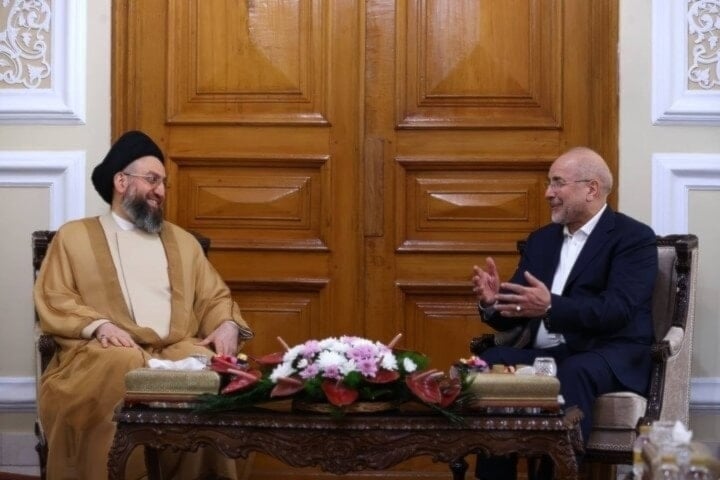Iran, Iraq leaders call for stronger parliamentary cooperation
Iran’s Ghalibaf and Iraq’s Ammar al-Hakim agreed in Tehran on boosting parliamentary ties, stressing regional stability and confronting Israeli occupation threats.
-

Speaker of the Iranian Shura Council, Mohammad Bagher Ghalibaf, and the leader of the Iraqi National Wisdom Movement, Ammar al-Hakim, September 7, 2025 (Mehr)
Iranian Parliament Speaker Mohammad Bagher Ghalibaf stressed the need to expand parliamentary cooperation and strengthen the role of the two countries’ legislatures in supporting ties between Iran and Iraq during his meeting in Tehran with Ammar al-Hakim, leader of Iraq’s National Wisdom Movement.
According to Mehr News Agency, the discussions covered the latest regional developments, with both sides emphasizing the importance of joint efforts to bolster stability and security.
Al-Hakim highlighted Iran’s role in confronting threats posed by the Israeli occupation, stressing that greater regional rapprochement could help prevent the spread of violence and instability in neighboring states.
Ghalibaf reaffirmed the significance of the fraternal ties between the two peoples and countries, noting that the parliaments of Iran and Iraq can play an influential role in strengthening strategic cooperation and advancing political integration.
Iran, Iraq vow deeper alliance
Iran has renewed its call for deeper cooperation with neighboring Iraq, portraying their partnership as central to defending West Asia from foreign aggression and instability.
During a meeting in Tehran with al-Hakim, leader of Iraq's National Wisdom Movement, Secretary of Iran's Supreme National Security Council Ali Larijani pressed for greater depth in bilateral relations. "In view of the current dynamic status quo, cooperation between Iran and Iraq must become more objective and tangible," he said, adding that Iraq is a "friendly and strong country" and that its partnership with Tehran is "strategic."
Al-Hakim praised Iran's response to the recent war with "Israel," declaring, "The 12-day Israeli military aggression against Iran, contrary to the Zionist entity's calculations, boosted the Islamic Republic's power in West Asia, and Muslims praised Iran's dominant role."
He went on to say, "Nowadays, the Zionist regime's wicked behavior as regards the 'Greater Israel' concept clearly shows that Iran was right to call Israel a cancerous tumor. The entire region has now become sensitive to Israel's adventurism."
Enduring Partnership
Iran-Iraq ties have evolved significantly over recent decades. Once bitter rivals during the 1980-88 Iran-Iraq War, the two countries drew closer after the 2003 US-led invasion toppled Saddam Hussein.
Since then, Tehran has become a central political and military actor in Iraq, backing Resistance parties and supporting Popular Mobilization Forces during the campaign against ISIS.
This deepening influence has often clashed with Washington's presence in Iraq, particularly after the 2020 US strike in Baghdad that killed Iranian commander Qassem Soleimani.
Today, Tehran and Baghdad view their strategic alliance as a shield against Zionist aggression and US destabilization efforts, an alliance that continues to shape a more independent and secure regional order.

 3 Min Read
3 Min Read








